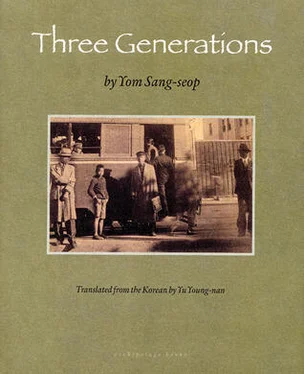The men in the room were once again deeply absorbed in their game and didn’t bother to look up at the intruder. Byeong-hwa recognized one or two of them from his own churchgoing days.
It took a while to wrap up the games after the food was brought in. When the players finally approached the tray, they were excitedly discussing the hundreds or thousands of points, and Byeong-hwa signaled that he would go. The master wouldn’t hear of it.
If Byeong-hwa wanted to go to the train station to see his friend off, the master said there was plenty of time. He offered some refreshments to Byeong-hwa, assuming that he hadn’t eaten yet. Byeong-hwa figured it would be better to eat than to leave hungry, so he began to devour the food put in front of him. He also drank whenever someone offered him a cup. The men then ordered another bottle of liquor, saying that they didn’t have enough to drink, though there was plenty of food. Tossing back the throat-stinging stuff as though it were water, they seemed more interested in getting drunk quickly than enjoying its flavor or savoring the moment and its snowy backdrop. Byeong-hwa shared their eagerness to get drunk, though with different motives.
“I hear you live somewhere outside Saemun,” the master of the house finally addressed Byeong-hwa. Until then, not a soul had spoken, busy as they were slurping and chomping on their food.
Though Byeong-hwa was his son’s friend, and Sang-hun felt comfortable with him, on this occasion Sang-hun was more solicitous than usual for he was afraid that Byeong-hwa might talk about what he’d seen.
“You seem to be doing all right, considering you’re not earning any money. I met your father a while ago, you know. Why don’t you just give up what you’re doing now and go home?” After several drinks, Sang-hun had grown talkative.
Byeong-hwa looked around at the others in the room and said, “You know, I wouldn’t mind going home if my father were more like all of you and didn’t actually pray before he drinks and eats. He’s well into the third stage of his opium addiction.” He smiled. People often referred to religion as opium.
Many in the room were embarrassed by Byeong-hwa’s remarks, but something defiant hardened their faces. Sang-hun was at a loss for words. When they sat down to eat at home, they all prayed, but they’d simply forgotten to do so here — almost as though God himself had exempted them from prayer before consuming Chinese food and booze. You bastard! shot out of the corners of the men’s eyes.
“I hate to point this out, but it seems to me that if all of you can enjoy yourselves like this on a regular basis, you must admit to enjoying the taste of freedom, joy, and peace — the taste of real life. Now think for a moment how frustrated you would feel if you had to sit like a bride on her wedding day, with your face bearing traditional ceremonial marks, your eyes cast downward, and your body squeezed into a cumbersome ceremonial gown.” This was how the tipsy Byeong-hwa assaulted them.
Offering neither opposition nor an excuse, Sang-hun responded: “It’s good to break out of the mold from time to time, but you can’t just abandon your self-control, drink all day, and wander around in a drunken stupor! It doesn’t hurt anyone though to take a break every once in a while from the discipline of everyday life.”
“I’m not talking about your drinking and having fun. I’m talking about your feelings, your conscience. To say that life can be free, fun, and peaceful only when you drink, play mahjong, and go out on the town is to take quite a decadent view of life. Ask yourselves this: What exactly is the purpose of the disciplined life you just mentioned? Suppose a more disciplined, a more arduous life than practicing religion actually exists.”
As Byeong-hwa poured out this passionate speech, as befits a literature-loving youth, many sat with frowns on their faces, wondering where the second bottle was.
“Liquor here, liquor come,” the Chinese deliveryman shouted in broken Korean, shaking the gate. The doors slid open and shut again, followed by a bustle of activity. Byeong-hwa wanted to talk more about his theories and annoy the others, but he wasn’t given the chance.
As soon as they finished eating, Sang-hun ushered Byeong-hwa out of the room with a sense of urgency. Byeong-hwa was not drunk, but Sang-hun assumed he was and wanted to send him off quickly, before he offended anyone again with his sharp tongue.
“Why don’t you spend your money on useful things instead of inviting all these people over to play mahjong? It’s just a high-class way of killing time.” Byeong-hwa offered Sang-hun this distasteful advice as they walked to the gate.
Spending money on useful things. Sang-hun remembered how he had given the same advice to his father not long ago. But he tried to come up with an excuse for himself. “Well, I wasn’t dreaming of a gambling life when I set up the mahjong table. I bought the set when I went to Antung, China, this spring because people told me I could get one there cheap.” Then he added, “You hold your alcohol pretty well. How about going somewhere else for another drink?”
“But your guests are still in the house. Please go back in. Besides, I have to go to the train station.”
“I’m sure Deok-gi’s gone by now.”
“I bet I can catch him if I go right away.”
“All the way to the station? Do you know what time it is?” said Sang-hun, looking at his watch. “It’s past eight. Come on, let’s go somewhere. Can you think of a good place?” Now that he had some alcohol in him, Sang-hun deserted his guests and followed Byeong-hwa, secretly hoping to visit Bacchus.
“I know of a place we could go.” Now that it was too late to go to the station, Byeong-hwa also felt he could use a few more drinks. “I’ll show you the way,” Byeong-hwa let Sang-hun board the streetcar ahead of him. He wanted to take Sang-hun to Bacchus. That modern girl they called Aiko had been haunting him. He wanted to see her again. They had been in the middle of a conversation when Deok-gi had dragged him out of the bar. She didn’t seem like an ordinary woman.
Sang-hun assumed Byeong-hwa would take him to Bacchus. What a perfect opportunity, he thought, but he was afraid that Gyeong-ae might act rudely in front of Byeong-hwa. And since Byeong-hwa was taking him to Bacchus only days after he had brought Deok-gi, he worried that he might lose face in front of Gyeong-ae. Then again, this might not be the case; it might not even matter. He knew it would be difficult for him to go to Bacchus sober. If he went with Byeong-hwa, it wouldn’t appear to Gyeong-ae that Sang-hun was following up on rumors but had simply stumbled in by coincidence. Actually, he wasn’t entirely sure of his own intentions. Cooped up in his room, Sang-hun had been thinking of Gyeong-ae all day long and had made up his mind to visit her that night. Drinking only made it easier to keep his resolve.
“So where are we going?” asked Sang-hun, feigning innocence, as they stepped off the streetcar. He wanted to hear what Byeong-hwa would say.
Byeong-hwa smiled to himself, thinking of how this man’s son had asked the same question in the same anxious manner when he had tagged along several nights before. He chuckled and said, “Just follow me. It is a great place. I’ll even introduce you to a girl so beautiful she could bring down an empire. Just don’t go thanking God for his grace when you see her. Instead, make sure you take me out again for another night on the town.”
“Hah! What use does an old man like me have for a beautiful girl?”
“You’re not an old man yet, though I must say it’s somewhat disheartening that older men lose their appeal to beautiful women. Our bodies may age, but our hearts stay young — isn’t that how it goes? There’s something quite deadly about a middle-aged love affair, don’t you think?” Byeong-hwa laughed out loud, as if he were mocking his companion. Sang-hun was astonished. Suddenly he was struck by the fear that Byeong-hwa actually knew everything, that he was taking him to Bacchus to humiliate him. But he couldn’t back out now.
Читать дальше












